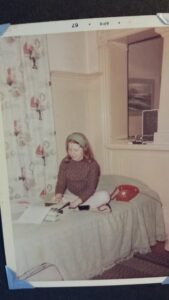There are two stories that humans have, since the first civilizations, been telling ourselves about migration. One is about the curse of wandering, the loss of Paradise when expelled from one’s birthplace. The other recounts how, in order to create anything new, we must break away from our suffocating places of origin and set out on a journey into the unknown.
—Ariel Dorfman, New York Review of Books
After living in Gainesville at the University of Florida I was incapable of living at home again. My parents were hard-working blue-collar people, basic in their ambitions. They did their best by us, were never mean, in our frequent dips into poverty sacrificed getting things for themselves to give us new clothes to start school. I can’t fault them.
It was me. I was a migrant of Dorfman’s second kind, without knowing, except in an unconscious way, that my place of origin was suffocating me, without knowing that if I were going to create anything new, I had to go. None of that was articulated in my twenty-year-old mind. I just knew I needed to go.

My bed in the apartment I shared with Tanya. My beloved portable typewriter, and yes, that black object is an ashtray. The red thing is a phone.
In a record shop, buying Dylan’s “Blonde on Blonde” album, I met two beautiful boys who’d just returned from San Francisco. They said a new day was dawning in Haight-Ashbury. They were growing out their hair and talking about cultural revolutions. I knew no Florida boys who were growing out their hair or talking about revolutions. It was June 1966. I’d just graduated with my Phi Beta Kappa Bachelor of Arts degree. Whatever bloomed in SF had already peaked, but we didn’t know that.
I waited out that summer waitressing in Miami, to see if I’d get into Iowa’s writing program. I did not. Rejecting the University of Florida’s grad school offer, I got on a bus to California, where that new world was being born. I took my life savings—under two hundred dollars—one suitcase and my portable typewriter.
Was it two days and three nights or three days and two nights? I scrambled into bus stations during every twenty-minute stop. Even dingy bathrooms were better than the bus bathroom. I bought sandwiches in cellophane to eat on board, washed my face in station sinks. I heard Simon & Garfunkel’s “Homeward Bound” on a midnight cafe jukebox and wondered what I was doing. I had no plans: a girl with plans wouldn’t have been traveling alone into the unknown, would have gone to grad school. But I was also risk adverse, had an uncle I barely knew in Sacramento, so that was my destination. No Haight-Ashbury crash pads for me.
The Sacramento terminal was in a sleazy section of downtown. We arrived near midnight. Rather than call my uncle, I walked across the street to get a room, the lobby small and dim, a couple in front of me, the woman in a tight miniskirt. The guy behind the counter growled at her, “this is the last one tonight.” I was too exhausted to care that the bed sagged and the carpet was stained. The door locked. There was a shower. I slept. For years the smell of Greyhound exhaust, of a bus station, nauseated me, a reaction that developed after the event, like PTSD.
My parents were mystified. They hadn’t understood my going to college—I was the first in my immediate family to do so. They had no money. I did college on my own, working and scholarships, finished debt-free, as it was once possible to do. I imagine they hoped I’d marry, have kids and live nearby.
“Is she pregnant?” That’s what Mom asked her brother, who relayed the conversation to me. It was the only reason she could think of for my trek. He was her much younger half-brother and they were seldom in touch. He laughed, asked me, “Are you?” I was not. They didn’t get it: I would have gone anywhere, so long as it was new and far away.
I stayed with my uncle, his new wife and baby until I found a studio apartment. One flight of stairs up from the street, it was $20 a month, above a liquor store whose red neon sign flashed on and off in my one window all night long. I wrote letters to former boyfriends, my mother, my roomie from Gainesville, the best girlfriend ever. Those were the days of long hand-written letters, full of angst and quest.
It would be weeks before I met Tanya, who needed a roommate, weeks before I got a job and embarked in earnest on a new life, my life. Before that, I obsessively recounted the money I had left. I first heard Simon & Garfunkel’s “7 O’Clock News/Silent Night” while red neon pulsed, sobbed for my country, for myself, relishing my misery. I would visit, yes, but never moved back home again. It never occurred to me.

Enchanting! Leaves us wanting more.
Kathleen, I do keep thinking about that time in Sacramento. Lived there little over a year and went through 3 jobs, 3 boyfriends, 4 addresses, an arrest for picketing, a march on Reagan’s capitol, and dozens of trips to SF on the weekend, during one of which I attended a Buffy St. Marie concert. That last remains a highlight in my memory.
I never knew that you lived in SF before coming to Denver. I did recognize the red phone, I think we had a black one and later a blue one. I was only 8 years old in 1966. Thanks for sharing!
Tony
Tony, que niño fuiste! I may have been that much older than you in 1966, but I’m not now.
Thanks, Pat. Great writing, as always. You took me right along with you, and reminded me of my first journey on my own, escaping home in a broken down ’59 Peugeot for a job in Richmond, VA.
Bob, there’s a story you need to write!
What a jewel you are. “She’s leaving home… bye bye.” The fact of walking away, into the unknown. Breaking the shell is as natural as breathing. It’s the only way to get around to learning how to fly.
Thank you, my darling.
This was a wonderful read! What an amazing time in a young woman’s life. Wanderlust at the finest level. Without the tarnish, a fine piece of silver is never so appreciated.
Oh, Meg, you are wise!
I hear you. That fall of “62 when I left home for Tallahassee I never looked back. It was thrilling to finally be on my own. In “66, a single mom with a three year old in hand, I started my teaching career in Miami. I’ve done a lot of travelling since then but never like you did then. Your posts often bring back great memories. Thanks.
I love this; I think I’ll go put on some Simon & Garfunkel and look out at the river. Things and places and the world change and change but young people always seem to have the same parts of their souls waking up. At least, as the quote says, one kind of young people. We who set out east of Eden to see if we’ll wind up in Canaan, or maybe just for the sake of wandering.
Chance, dear grandson, a wonderful comment and of course your own beginning journey now inspired me to reconstruct some of this memory. Thanks so much for posting here.
I, too, want more of this story! What lovely writing and a beautiful introduction to a strong and creative young woman who made her way very far, at a vibrant time, and gives us these gifts of words.
J-L, nag, nag. You too. But yes, I’m thinking I should continue this. Thanks so much for weighing in.
Thanks, Pat.
Oh my .. we all must have been traveling to as much as from in the 60’s. My mode was train but motive and reason similar. You pulled me into your journey and made me grin at the grit of it all. Thanks!
Hola dear Pat, I so want to read more! More! This is Fabulous!
My mode of transport on the first sojourn to California was my sister’s rusted green VW bug with an 8 track player in the glove box. We drove straight thru and even picked up a male hitchhiker who enjoyed our loud “carol-ing” with Tapestry. ah, the good old days…..
Those were the days when you picked up hitchhikers without worrying about it! Saw your piece in Clarissa’s pandemic writings posts for RMPBS, yours and Jana’s. Good company!
Pingback: Prologue | Holding the Light